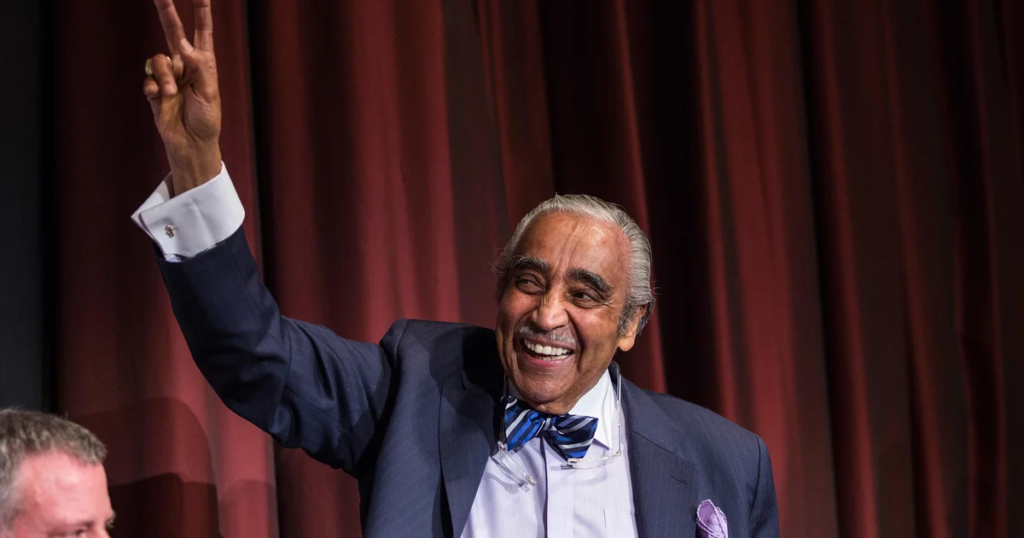On May 26, 2025, the United States lost one of its most influential and enduring political figures, Leadership in American Politicsformer Congressman Charles B. Rangel, who passed away at the age of 94 in a Manhattan hospital. Rangel, a Harlem native, dedicated nearly five decades to public service, representing New York’s 13th Congressional District in the U.S. House of Representatives from 1971 to 2017. Known for his gravelly voice, sharp wit, and unwavering commitment to civil rights, Rangel’s legacy as a trailblazer, war hero, and legislative powerhouse continues to resonate across the nation. This article explores Rangel’s remarkable life, his contributions to American politics, and the lasting impact of his work.

Early Life and Military Service
Charles Bernard Rangel was born on June 11, 1930, in Harlem, New York, a neighborhood that would shape his identity and political career. Growing up in a working-class family, Rangel faced challenges early on, including dropping out of DeWitt Clinton High School in the Bronx. At 18, he enlisted in the U.S. Army, serving as a sergeant in the all-Black 503rd Field Artillery Battalion in the 2nd Infantry Division during the Korean War. His bravery in combat earned him a Purple Heart and a Bronze Star, experiences that instilled a deep sense of duty and resilience.
After returning from the war, Rangel completed his high school education at 23 and went on to earn a bachelor’s degree from New York University and a law degree from St. John’s University. To support himself, he worked as a bellhop at Harlem’s Hotel Theresa, where he once carried bags for jazz legend Billie Holiday, an anecdote he fondly recalled in later years. These early experiences grounded Rangel in the struggles and aspirations of his community, shaping his lifelong commitment to social justice.
A Political Career Rooted in Harlem
Rangel’s political journey began in 1970 when he defeated the legendary Harlem politician Adam Clayton Powell Jr. to win a seat in the U.S. House of Representatives. Representing New York’s 13th District, which included Harlem and parts of Upper Manhattan, Rangel became a fierce advocate for his constituents. Known as “Charlie” to friends and constituents, he was a familiar and approachable figure on Harlem’s streets, often seen engaging with residents at local events or the American Legion Post 398, where he was a longtime member.
Rangel’s tenure in Congress was marked by his role as a founding member of the Congressional Black Caucus (CBC) in 1971. The CBC became a powerful voice for African American communities, advocating for civil rights, economic equality, and social justice. Rangel’s leadership in the CBC helped elevate issues affecting Black Americans to the national stage, cementing his reputation as a champion for marginalized communities.

Legislative Achievements and Impact
As a congressman, Rangel was a skilled legislator known for his ability to navigate complex political landscapes. He served on the powerful House Ways and Means Committee, becoming its first African American chairman in 2007. This role gave him significant influence over tax policy, trade, and social welfare programs. Rangel’s legislative fingerprints can be found in numerous bills that shaped urban America, particularly Harlem. He played a key role in expanding tax credits for businesses in struggling neighborhoods, a policy praised by former President Bill Clinton for revitalizing economically challenged areas.
One of Rangel’s most notable contributions was the “Rangel Amendment” of 1987, which cut tax breaks for U.S. companies investing in apartheid-era South Africa. This measure sent a strong message against racial injustice globally and underscored Rangel’s commitment to human rights. He was also a primary co-sponsor of the Affordable Care Act, working closely with then-President Barack Obama to expand healthcare access for millions of Americans.
Rangel’s influence extended beyond policy. He was instrumental in convincing Hillary Clinton to run for a U.S. Senate seat in New York in 2000, launching her political career. Clinton later paid tribute to Rangel on X, calling him “a beloved icon and public servant of New York.” His ability to forge alliances across party lines, including with conservative Republicans, earned him respect as a shrewd and pragmatic legislator.
Challenges and Controversies
Despite his accomplishments, Rangel’s career was not without controversy. In 2010, he faced a significant setback when the House Ethics Committee found him guilty of 11 ethics violations, including improper solicitation of donations for the Charles B. Rangel Center for Public Service at City College of New York and failure to report rental income from a property in the Dominican Republic. The House voted to censure Rangel, a rare and public rebuke that marked him as the 23rd member in the chamber’s history to receive such a punishment. The censure forced him to step down as chairman of the Ways and Means Committee, a position he had held with distinction.
Rangel maintained that the violations were unintentional and expressed regret, but he remained defiant in his commitment to public service. He continued to serve in Congress until his retirement in 2017, winning re-election multiple times despite the scandal. For many in Harlem, Rangel’s contributions outweighed his missteps, and his accessibility and dedication to his constituents kept him a beloved figure.

A Lasting Legacy
Rangel’s death prompted an outpouring of tributes from political leaders, colleagues, and constituents. House Minority Leader Hakeem Jeffries, a fellow New Yorker, described him as “a phenomenal patriot, hero, statesman, leader, trailblazer, change agent, and champion for justice.” Senate Minority Leader Chuck Schumer called him “a great man, a great friend, and someone who never stopped fighting for his constituents and the best of America.” New York City Mayor Eric Adams praised Rangel’s service as a decorated veteran and congressman, noting his profound impact on the city.
Rangel’s legacy lives on through the Charles B. Rangel Center for Public Service at City College of New York, which continues to train and inspire future generations of public servants. His family, including his children Steven and Alicia, emphasized his dedication to equity and opportunity, stating, “A towering figure in American politics, Congressman Rangel dedicated over four decades of his life to public service.”
Rangel was preceded in death by his wife, Alma, whom he met in the 1950s at Harlem’s Savoy Ballroom. Their partnership was a cornerstone of his personal and political life, and her passing in October 2024 left a void in the Harlem community. Rangel’s death just months later marked the end of an era for a neighborhood and a nation that he served with passion and purpose.
A Voice for Harlem and Beyond
Charles Rangel’s life was a testament to the power of resilience, service, and advocacy. From his humble beginnings in Harlem to his historic tenure on Capitol Hill, he broke barriers and fought for those often overlooked by the political system. His work on civil rights, economic justice, and global human rights left an indelible mark on American history. While his career was not without flaws, Rangel’s ability to connect with people, bridge divides, and push for meaningful change defined his legacy.
As the nation mourns his passing, Rangel’s story serves as a reminder of the impact one person can have through dedication and perseverance. His raspy voice may have fallen silent, but the echoes of his contributions will continue to inspire future generations of leaders. For those in Harlem and beyond, Charlie Rangel will always be remembered as a hometown hero who never forgot where he came from.
Also Read :- AI-Driven Ad Campaigns: Personalizing Content, Boosting Engagement, and Sparking Privacy Debates






